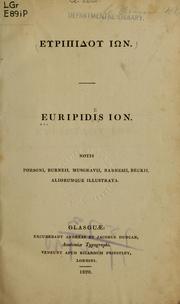Buy this book

he Ion is the shortest, or nearly the shortest, of all the writings which bear the name of Plato, and is not authenticated by any early external testimony. The grace and beauty of this little work supply the only, and perhaps a sufficient, proof of its genuineness. The plan is simple; the dramatic interest consists entirely in the contrast between the irony of Socrates and the transparent vanity and childlike enthusiasm of the rhapsode Ion. The theme of the Dialogue may possibly have been suggested by the passage of Xenophon's Memorabilia in which the rhapsodists are described by Euthydemus as 'very precise about the exact words of Homer, but very idiotic themselves.' (Compare Aristotle, Met.)
Ion the rhapsode has just come to Athens; he has been exhibiting in Epidaurus at the festival of Asclepius, and is intending to exhibit at the festival of the Panathenaea. Socrates admires and envies the rhapsode's art; for he is always well dressed and in good company--in the company of good poets and of Homer, who is the prince of them. In the course of conversation the admission is elicited from Ion that his skill is restricted to Homer, and that he knows nothing of inferior poets, such as Hesiod and Archilochus;--he brightens up and is wide awake when Homer is being recited, but is apt to go to sleep at the recitations of any other poet. 'And yet, surely, he who knows the superior ought to know the inferior also;--he who can judge of the good speaker is able to judge of the bad. And poetry is a whole; and he who judges of poetry by rules of art ought to be able to judge of all poetry.' This is confirmed by the analogy of sculpture, painting, flute-playing, and the other arts. The argument is at last brought home to the mind of Ion, who asks how this contradiction is to be solved.
Buy this book

Previews available in: English Ancient Greek Latin
Subjects
Drama, Ion (Greek mythology), Translations into English, Theseus (Greek mythology), Seven against Thebes (Greek mythology), Orestes (Greek mythology), Adrastus (Greek mythology), Ion (Euripides), Epic poetry, Continental european drama (dramatic works by one author), Euripides, Greek drama, translations into english, Greek drama (Tragedy)People
EuripidesShowing 10 featured editions. View all 55 editions?
| Edition | Availability |
|---|---|
|
01
Ion: Orestes ; Phoenician women ; Suppliant women
2001, Oxford University Press
in English
0192832603 9780192832603
|
cccc
|
| 02 |
cccc
|
| 03 |
cccc
|
| 04 |
cccc
|
| 05 |
cccc
|
| 06 |
bbbb
|
| 07 |
bbbb
|
| 08 |
bbbb
|
| 09 |
bbbb
|
| 10 |
aaaa
|
Book Details
Edition Notes
Greek text with Latin version.
Greek title precedes Latin title.
The Physical Object
ID Numbers
Community Reviews (0)
Feedback?History
- Created August 30, 2010
- 4 revisions
Wikipedia citation
×CloseCopy and paste this code into your Wikipedia page. Need help?
| July 18, 2018 | Edited by MARC Bot | update language=grc |
| February 14, 2012 | Edited by AnandBot | Added new cover |
| October 12, 2010 | Edited by WorkBot | merge works |
| August 30, 2010 | Created by ImportBot | Imported from Internet Archive item record |





















